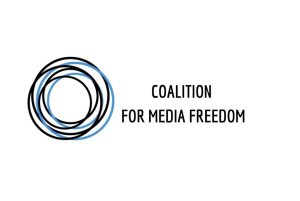As Albanian online portals spread falsehoods to discredit women in the media, a culture of silence and weak legal protections leave women journalists increasingly vulnerable.
In October last year, Safejournalists.net, a platform created by journalists’ association from the Western Balkans, published a report that warned about growing digital threats to journalists and human rights defenders in Albania, particularly women.
Within days, the report’s author, media researcher Blerjana Bino, found herself in the crosshairs of an online portal that labelled her a “civil society spider”.
“The attacks on me, my organisation, and our partners started right after we published the annual report on media freedom and journalist safety,” Bino, 39, told BIRN. “The people behind it weren’t interested in facts; they just wanted to create a story to undermine our work, our credibility, and our character.”
“I knew their tactics well, since we’ve monitored similar attacks on other journalists but I refused to let them silence or intimidate me.”
Bino’s case is part of a trend in Albania, where women journalists, activists, and politicians are coming under increasing attack online, with offensive language, social media campaigns, and fake news becoming the norm.
According to Bino’s most recent report on Albania for Safejournalists.net, “71.4 per cent of women journalists have suffered verbal abuse, and more than a third have been targeted online. These attacks often force them into self-censorship, harming their work”.
A BIRN survey of Albanian newsrooms found that many journalists – men as well as women – are reluctant to speak out when their own outlets publish disinformation or use discriminatory language against women, fearing they might lose their jobs and their livelihoods.
Defamation law creates ‘climate of fear’
Without a specific law in Albania to address cyber-violence against women, the issue is addressed only in a piecemeal manner via other laws concerning, for example, discrimination and personal data protection.
“Platform accountability is weak too,” said digital rights researcher Esmeralda Metko, referring to the responsibility platforms have to monitor and manage published content.
Although some general laws exist against harmful content, most platforms lack real filters or moderation systems.
Media researcher Ina Allkanjari identified another legal barrier: defamation in Albania is still considered a criminal offence, despite recommendations from international rights bodies that it should be treated solely as a civil matter.
“This situation not only makes it easier to abuse the law to intimidate journalists but also creates a climate of fear that discourages critical reporting.”
Metko added: “The Penal Code requires false information to be corrected in defamation cases, but this is rarely enforced and many people don’t know about it. When corrections do happen, they often don’t reach the same audience that saw the original false claims, making them ineffective.”
In the case of Bino and other women journalists, articles about them that media organisations deem defamatory remain online, uncorrected, despite containing offensive language and unfounded accusations.
Chaotic media landscape
According to Albania’s Union of Journalists, most of the more than 900 digital-native outlets – media founded and operating exclusively online – operating in Albania lack basic editorial oversight, ownership transparency, or content moderation.
While Albania’s Broadcasting Code and laws on public information set down clear principles to ensure objectivity and impartiality, Allkanjari said, “these apply mostly to traditional audiovisual media, not to online platforms”.
“Many digital media are not officially registered, and there is no functional monitoring system,” Allkanjari told BIRN.
Metko echoed the concern: “The Law on Audiovisual Media is fully aligned with the EU Directive. However, it only applies to audiovisual services, not to written media or online portals. As a result, digital news websites fall outside the law’s scope and remain legally unregulated.”
This unregulated landscape is driven by an economic model that rewards sensationalism.
“The race for clicks and visibility now outweighs the mission to inform accurately and ethically,” said Nevila Gjata, editor-in-chief of the Albanian fact-checking organisation Faktoje.al. “Emotionally charged, misleading stories spread faster than responsible journalism.”
Metko noted that media freedom and freedom of expression are important benchmarks on Albania’s path to European Union accession, and that Albania must improve editorial independence, transparency and protections for journalists.
However, “While the country is aligning its laws with EU digital directives, enforcement remains weak and mostly administrative”, Metko said. “Without strong institutions and follow-through, these reforms risk being only symbolic.”
Gendered disinformation and politics
Women politicians are particularly vulnerable, said Gjata.
“Women, especially in politics, face coordinated attacks, false claims of corruption, personal insults, and exposure of [their] private lives,” Gjata told BIRN, with the trend particularly apparent during Albania’s parliamentary election this year.
It risks “normalisation”, she said.
“Harsh political language, weak institutional responses, unregulated digital spaces, and declining editorial ethics all worsen the problem, especially targeting women’s appearance over their ideas.”
A study published by Faktoje.al in 2023 found that media affiliated with political parties produce much of this gender-based disinformation, especially around elections.
“Disinformation campaigns targeting women influence the Albanian public by appealing to traditional family values and gender roles,” Faktoje.al wrote. “Media outlets either create or become part of these campaigns for financial gain. Disinformation involving women generates higher engagement – especially when headlines involve violence, insults, or exaggerations.”
Freelance journalist and media researcher Geri Kolgega shared the same concern:
“Journalists know they must produce clickable content, often normalising harmful narratives about women,” he said.
“There is no support or ethical guidance from newsroom leadership. On the contrary, such behaviour is often encouraged. In the name of clicks, profits, and sensationalism, everything becomes justified. Ironically, while chasing engagement, we erode public trust. The pressure to meet unrealistic targets traps journalists in a vicious cycle pushing unethical methods.”
No safeguards
With traditional media outlets in Albania largely concentrated in the hands of a few politically-connected moguls, many journalists have moved online, seeking, said Allkanjari, “freedom and independence”.
Instead, they “often find themselves operating in spaces with no structural safeguards, ethical standards, or professional norms”.
“We need to strengthen self-regulation and ethics training,” Allkanjari told BIRN, “and ensure legal and fiscal transparency so the public knows who owns and funds media outlets.”
Media literacy is also essential, she said.
“Citizens must learn to distinguish between responsible journalism and hidden propaganda.”
Allkanjari, who has trained journalists in fact-checking, also warned of the impact on audiences, which, she said, are “increasingly exposed to fabricated news”.
“Many people cannot distinguish a serious source from portals spreading misinformation, mainly due to low media literacy,” she said. “While some readers are more critical, most are driven by clickbait and share content without verification.”
This puts at risk public trust in journalism overall, Allkanjari added.
Meanwhile, fact-checking organisations like Faktoje.al face constant pressure while competing with viral misinformation.
In July 2025, Faktoje.al became the target of a smear campaign accusing it of “dangerous censorship”.
“We’ve long faced political pressure to soften fact-checking, and systematic attacks from those who promote hate speech and conspiracy theories,” said Gjata. “Yet that does not stop us from providing independent journalism grounded in facts, official data, and accurate verification.”
Lack of institutional support
Though physical attacks on women journalists are rare, with only two such cases reported in 2024, online threats and intimidation go mostly unreported.
The Safejournalists.net report on Albania found that nearly half of those targeted reported receiving either insufficient backing [19.1 per cent] from their employer or no backing at all [29.4 per cent].
“Even when sexist media coverage or defamation is obvious, complaints are rarely filed, and some are withdrawn,” Albania’s Commissioner for Protection from Discrimination told BIRN.
“Most active complaints come from civil society over stereotypical language.”
Unlike many others, Bino’s case did not pass unnoticed.
After the smear campaign began, her social media profiles were flooded with messages of support, both from colleagues and strangers.
“It was an overwhelming but empowering moment,” Bino recalled. “It reminded me why our work matters. Solidarity shows that no one has to face these attacks alone. When society pushes back, it creates a protective barrier. It sends a message to those behind the smear campaigns: the professional community will not stay silent.”
Source: BalkanInsight




